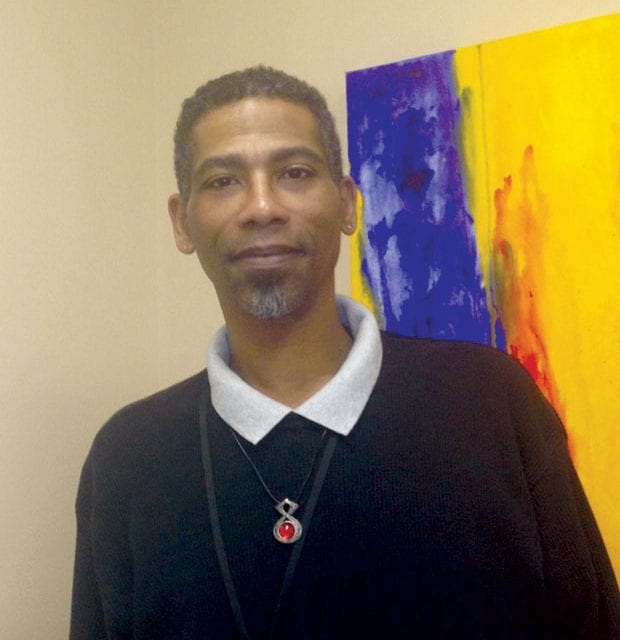Longtime HIV activists will be ‘the face of AIDS’ when they share their stories with Texas lawmakers

AIDS ADVOCATE | Aaron Taylor, who has lived with HIV for more than two decades, is attending HIV Advocacy Day in Austin for the first time to tell lawmakers how funding AIDS programs kept him healthy.
AUSTIN — Aaron Taylor is going to Austin to tell legislators his story about living for the past 25 years with HIV.
Taylor’s been positive since 1989. When diagnosed at age 26, he changed his diet and sleep habits and began to exercise. He remained healthy without drugs being available for seven years.
His partner also tested positive. By the time he got on medication in 1997, his health was failing and he died in 1999.
He began working as a volunteer peer navigator at AOC before becoming a part-time patient navigator on staff. He helps newly diagnosed younger people maneuver within the system to get into care.
March 4 is HIV Advocacy Day at the Legislature and Taylor will be one of six people from AIDS Outreach Center participating.
He said he’s going to Austin just to tell his story and plans to talk about the rate of infection.
“Some of the highest infection rates are among young people,” he said. “We need more programs, affordable treatment, more testing and education.”
Januari Leo, Public Affairs Field Specialist for Legacy Community Health Services in Houston, helped organize Advocacy Day.
She said the best thing the state of Texas can do is accept Medicaid expansion.
“We have a 24 percent uninsured rate in Texas,” she said. “People deserve to have healthcare.”
She said Ryan White funding takes care of some of the uninsured, but the reallocation process every few years makes this sort of funding very unreliable.
And while more people test positive each year and others with HIV live longer, Ryan White funding has remained flat over the past four years.
Leo said in addition to lobbying for Medicaid expansion, advocates will be supporting HB 1119 written by state Rep. Yvonne Davis of Dallas.
When healthcare providers take a blood sample, an HIV test would become routine under the bill, unless the patient opts out. Health insurance would be required to cover the cost of the test.
“It’s not a standard test that doctors give,” Leo said. “There’s so much stigma, people get freaked out.”
Under Ryan White, there was a push to get people tested and get them into care, but much of that testing is done in areas with higher infections of HIV. She said testing by doctors in suburbs and rural areas is rare.
AOC education volunteer Sandra Ford will also be going to Austin.
“I want to tell them I’m a disabled veteran, so I can afford my medication,” Ford said. “For others it’s sky-high.”
Ford probably has been positive since 2008 but was diagnosed in 2009. She contracted HIV from a guy she’d known since high school and went to church with who didn’t reveal his status to her.
She said there needs to be more education. When she speaks, she promotes condom use and talks about how the disease is and is not spread.
She said former friends avoid her, thinking they can get the disease from drinking after her or breathing the same air.
When she talks to younger people, she gives them a message.
“Don’t be stupid twice,” she said.
She tells them not to have sex before marriage, but if they do and don’t protect themselves, that’s being stupid twice.
AIDS Services of Dallas resident Helen Goldenberg plans to talk to lawmakers about Medicaid expansion, which Gov. Rick Perry has rejected.
“If we don’t keep funding as it is, I’ll be negatively impacted,” she said.
Goldenberg, 67, said after living with the disease for almost 30 years, she considers herself “the face of AIDS.”
A doctor who recognized her symptoms as opportunistic infections first diagnosed the 12-year resident of ASD Spencer Gardens with AIDS in 1984, without a blood test. She ignored the diagnosis since she was engaged to be married and didn’t fit the stereotypical profile of people contracting the disease.
But she was living in San Francisco at the time and her doctor already had quite a few patients with AIDS. When she found out her fiancé was HIV-positive, she realized the doctor was correct.
Although Medicare covers her healthcare, the number of people living with HIV in Texas increases each year as people live longer and more are diagnosed.
Many of those newly diagnosed will only receive healthcare if they are accepted into Medicaid, especially in parts of Texas not covered by a county hospital such as Parkland.
Goldenberg serves on the Ryan White Planning Council and is president of the Spencer Gardens residents’ council. She credits ASD for her health and for giving her a place to raise her two grandchildren. One, a 20-year-old University of North Texas student, still lives with her.
“By them putting a roof over my head, creating safety, providing food — that allowed me the freedom to work on me and be proactive in managing my health,” she said.
By proactive, Goldenberg means not just taking care of her own health. She means speaking to legislators directly and telling them how they can help people with HIV.
HIV Advocacy Day, First United Methodist Church Family Life Center, 1300 Lavaca St., Austin. March 4 at 10 a.m. TexasHIV.org/events.
This article appeared in the Dallas Voice print edition March 1, 2013.


